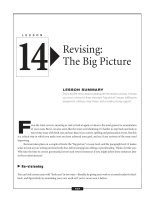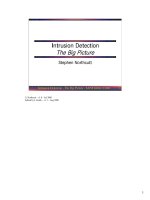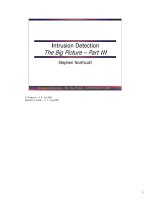Big picture vocabulary text
Bạn đang xem bản rút gọn của tài liệu. Xem và tải ngay bản đầy đủ của tài liệu tại đây (49.08 KB, 0 trang )
Big Picture Vocabulary Text
Hello, this is AJ. Welcome to the vocabulary lesson for “The Big Picture.” I’ve got some
good news. This is a pretty easy article so the vocabulary lesson is quite short. Yay!
Let’s start it.
Our first word is memorize. Dennis said real learning is not memorizing knowledge.
Real learning is knowing how to use and find knowledge or facts. To memorize means
to remember. It really means to force yourself to remember…force to remember. Make
yourself remember. Force yourself to remember. That’s memorizing. For example, you
have a word list and you want to memorize the meaning of each word. So you repeat it
again and again and again and again and again. Memorize means remember.
Memorize means remember. Memorize means remember. Memorize means
remember. Force to remember, force to remember, force to remember, force to
remember. Memorize means force to remember. Memorize means force to remember.
That’s the memorization technique. Memorization is the noun. You are memorizing the
meaning…just repeating again, again, again, again. You are memorizing the word and
its meaning. So we don’t memorize here. Do not do that. Just listen to the vocabulary.
Don’t try to study it, okay? We don’t study at Effortless English. We listen and we
enjoy. That’s all. So you listen to the vocabulary a few times and then you listen to the
other lessons. The other lessons are the most important. Don’t try to memorize. Don’t
force yourself to remember. It’ll happen. You will remember automatically with our
method, don’t worry.
Our next word is integrate. Dennis says real learning is knowing how to integrate
knowledge and use it. To integrate means to mix or combine or merge. It means you’re
putting things together, putting things together…mixing…so to integrate means to mix.
And what it means is, it means you learn something new, it’s not enough. You have to
combine it, you have to mix it with everything you already know, right?
You already know a lot of things then you learn something new. You have to combine
the new thing with the old knowledge. You are mixing them together. You’re seeing
how they go together. You see how they fit together. How they integrate, how they mix.
So integrate has this idea of mixing and combining, putting things together in a useful
way. So to integrate…again, to integrate…put together, mix together in a useful way, in
an effective way. That’s integrate.
Our next word is noted. Noted, he says as noted psychology expert Seymour Sarason
said…and then he tells you what he said. Noted psychology experts, so Seymour
Sarason is a noted psychology expert. Well, noted just means famous, that’s all it
www.EffortlessEnglishClub.com
means. Noted means famous or well‑known. And it also has this idea of skillful,
someone who is good at what they do. So it’s not famous, it’s not like a movie star
famous, like everybody knows them. That’s not noted. Noted means famous because
they’re good at something.
So Seymour Sarason is a very good psychologist so Seymour Sarason is a famous
psychologist. Not in all of the world, but psychology people, they know this person. So
again noted has this idea of being famous and also has the idea of being an expert. So
he is actually kind of repeating himself, he says noted psychology expert. So noted also
has this idea of being an expert. You’re famous because you’re an expert.
Alright, our next word is therapy, therapy. So Seymour Sarason said that patients don’t
get better during therapy, they get better between therapy sessions, therapy times.
Therapy just means a cure. It’s a healing treatment, a healing action. So for
psychologists, right, they sit and they talk to the patient. The patient is depressed, for
example, feels very sad. The psychologist talks to the patient, helps the patient feel
better. That’s therapy. That process is therapy. It’s a cure, it’s a healing treatment. The
psychologist is trying to heal, trying to cure the patient. And the process, the action of
doing that is called therapy, therapy.
So the psychologists they think, they believe that actually the patients get better
between the therapies. It’s not the time that they sit and talk, it’s after…after the patient
thinks about it and after the patient changes their behavior and after the patient changes
their beliefs, changes their ideas. So that’s when most of the learning is really
happening for the patient. Not during the time they talk to the psychologist. So he’s
comparing this to school. He’s saying that it’s the same for students. Students actually
learn more outside class than they do inside the class.
Our next word is primarily, primarily. So this is the quote from Tom Magliozzi, he’s
talking about what do schools do. Schools just prepare you for more schools. He says
“It seems to me that schools primarily teach kids how to take tests.” Primarily means
firstly, or mostly. It really has this idea of mostly. That’s what they mostly do. Mostly,
primarily, schools teach kids how to take tests, and adults, too. So they mostly teach
kids and adults how to take tests. They primarily teach kids and adults how to take
tests. So again, primarily means mostly, mostly or firstly.
And finally, our last word for the vocabulary lesson this time, contestant, contestant.
Contestant, he says that taking tests is a skill that no one uses unless they are a
contestant on a quiz show. A quiz show is a game show like a TV show where you take
a test and then you win some money. So that’s the only time we take tests when we’re
adults. In the real world we almost never take tests. Only in school, only for school do
we do it.
So a contestant on a quiz show, a contestant on a game show…contestant means
player, someone who’s playing on the show. Or participant…someone who is
participating on the show. So contestant means participant or player or competitor. So
www.EffortlessEnglishClub.com
again, contestant means player or participant or competitor. They’re all similar
meanings. So the only people who need the skill of taking tests, the only time that skill
is useful is if you are a player, a contestant on a game show, on a quiz show. And of
course, that’s not many people. He’s kind of joking. It’s a joke.
Alrighty, well that’s the end of the vocabulary lesson for “The Big Picture.” Let’s keep
going on to the mini‑story.
www.EffortlessEnglishClub.com









